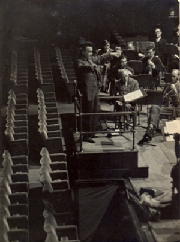|
George F. Linstead |
|
|
Appreciation An Evaluation
of Linstead as a Musician by Christopher
Powell
Linstead did not belong do any ‘School’
as such and, in that sense, he is like a provincial Frank Bridge but of a later era. He certainly admired Poulenc and Les Six, but it is difficult to find much influence of French
music in his works outside a couple of the shorter piano pieces and his Overture ‘In the French Style’. Havergail
Brian, who also had a provincial northern background, is a point of comparison in terms of style and individuality and perhaps
even in his approach to harmony. Linstead was clearly an eclectic, but unlike Bax, Britten
or Ireland, one who never developed a consistent style but who nevertheless was able to maintain in successive pieces a personal
touch—particularly in the harmony. To the historian, it is not perhaps Linstead’s
compositions that prove the most interesting aspect of his life. Rather, it is the part he played in the history of music
of his adopted city for half a century and the way his life illustrates the career of a freelance professional musician of
his times, not least in the wide range of tasks he had to perform in order to make a living from music. It is difficult to
decide whether Linstead was at his best as a composer, performer or a writer on music. He himself would have wished to be
remembered as a composer, but the truth is more complex. He was a gifted musician who reached fully professional standards
in all three areas of composition, performance and musicology. His contribution does not lie in just one of them, it rests
on all three. He was certainly one of the most resourceful musicians of his generation.
Not least, his life illustrates how it was possible for very talented but poor boy in the first half of the twentieth
century, with the help of other distinguished and talented musicians, to reach the highest professional standards without
ever having attended full-time either a college or a university. In that sense alone, there is not more worthy successor to
Sir Henry Coward in the history of music in Sheffield, than Dr George Frederick Linstead.
|
||
|
Enter supporting content here |
